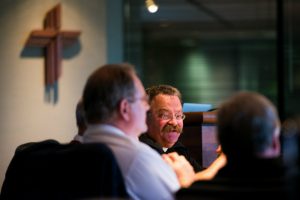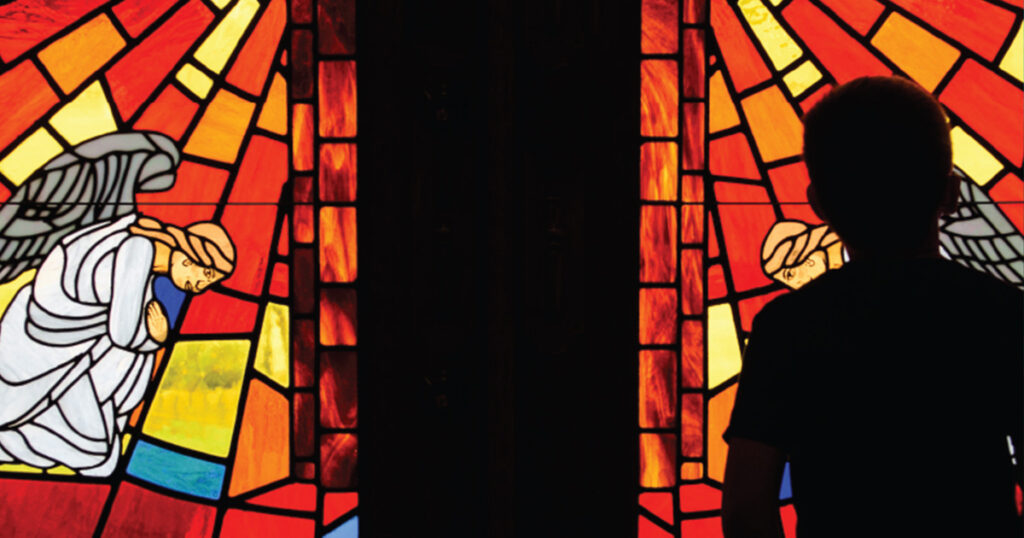by Matthew C. Harrison
More than a century ago, President H. C. Schwan addressed the Synod in convention. He urged that the Synod be careful to maintain its unity by avoiding either “faddishness or sluggishness.” That’s a wise and biblical approach. Freedom is to be used to serve, not to rubberneck and copy the latest methods of pop Christianity (cf. Gal. 5, Rom. 14). Yet the Gospel also creates faith, and as Luther says:
Faith is a divine work in us. It changes us and makes us to be born anew of God (John 1). It kills the old Adam and makes altogether different people, in heart and spirit and mind and powers, and it brings with it the Holy Spirit. Oh, it is a living, busy, active, mighty thing, this faith. And so it is impossible for it not to do good works incessantly. It does not ask whether there are good works to do, but before the question rises, it has already done them, and is always at the doing of them. [Commentary on Romans (Zondervan, 1954), xvii.]
 We live in urgent times. The onslaught of the world throws us back on our heels. The horrid decline of the recognition of natural law in our nation and the formerly Christian West presents a shocking display. What the Bible calls good, the state calls evil. What the Bible calls evil, our state calls good. I believe that we are living in the last times and that we are experiencing not only individuals hardening their hearts against God but now also God hardening individual hearts as he did to Pharaoh.
We live in urgent times. The onslaught of the world throws us back on our heels. The horrid decline of the recognition of natural law in our nation and the formerly Christian West presents a shocking display. What the Bible calls good, the state calls evil. What the Bible calls evil, our state calls good. I believe that we are living in the last times and that we are experiencing not only individuals hardening their hearts against God but now also God hardening individual hearts as he did to Pharaoh.
Last spring and early summer, I attended 21 LCMS district conventions. Over the past two years, First Vice President Mueller, and Synod Vice Presidents Wohlrabe, Nour, Murray, Preus, Kuhn and Esget have made official visits to some 30 of our 35 districts. What have we found?
- Despite deep demographic challenges (virtually no district has grown since the late 1990s), the palpable attack of culture, the noticeable shift in generational attitudes toward church attendance and stewardship of life and resources, we’ve noted a determination, a steadfastness, a resolve among our pastors and people. We know what we believe. We stand together in Christ. And we will continue—faces fixed like flint—passionately and compassionately to speak the Gospel to all. And that resolve is apostolic: “I determined to know nothing among you but Christ and him crucified.” In fact, it’s Christ-like! (Luke 9:51).
- We’ve noted a positive spirit virtually across the board, but particularly where circuits and districts have been involved in the Koinonia Project. In fact, I believe the Koinonia Project is one reason the Synod has been very calm, while bold and vigorous in mission, perhaps more internally peaceful than it has been in decades.
- We have enduring challenges and differences among us. Many of the Seminex issues regarding the nature of the Bible are all but behind us. Worship continues to be a challenge. However, we noted that across the board in the district conventions, the worship in which we participated was liturgical, creedal and well done. The preaching was also well done. I repeatedly told district delegates gathered two things about worship: (1) There is very broad freedom in this area, granted by both the Lutheran Confessions and the Holy Scriptures (e.g., Augsburg Confession VII); (2) If a congregation is ditching Confession and Absolution, the readings, Law/Gospel preaching, the creeds, messing with the Lord’s Words of Institution—that is out of bounds.
- I also told district conventions that congregations simply printing a statement about what the Lord’s Supper is and then inviting all who believe that statement to come to the Lord’s Supper are not acting in accord with the stated and re-stated biblical and confessionally faithful practice of the Synod. I urged (as the 2013 Synod convention mandated that I do) that better practice prevail among us. I also noted that if bulletin announcements would request that visitors please speak to the pastor or an elder prior to communing, that this would greatly diminish the dissension among us on this topic. The position of the Synod is that normally only members of LCMS congregations are to commune, but that there are extraordinary circumstances under which exceptions may be made using pastoral discretion. Inviting everyone who reads a statement in the bulletin to commune without ever speaking with a pastor is not “pastoral discretion.” Our Confessions state, “No one is communed unless they are first examined” (AC XXIV 6). For further information, please see the recent document from the CTCR, “Guidelines for Congregational, District, and Synodical Communion Statements.”
The 2013 convention mandated the creation of a task force to propose a solution to the issues surrounding the use of Licensed Lay Deacons. Since 1989 (with a brief hiatus), we have been licensing laymen to preach and administer the Sacraments in what is now about 240 situations. And these have been wonderful, dedicated men. The problem is that our Lutheran Confessions, to which we are absolutely bound because they are in accord with sacred Scripture, state, “No one should preach or teach without a regular call” (Augsburg Confession XIV). At the same time, we must have the flexibility to make sure that small, unique and rural churches that cannot afford a pastor are served. A solution has been proposed by the task force this past summer and most recently commended by the CTCR and both seminaries. God help us. At the next convention, we should be able to set this matter aside as one that causes consternation and division.
There is much more to say. We’ve been working hard with our Concordia universities, and they’ve formulated and committed to Lutheran distinctives as they carry out their great endeavor, which they do with such expertise. We are determined to double our career missionaries and desire to double them again. (Only 10 percent of our congregations are pledged supporters of LCMS missionaries, so there should be plenty of capacity to increase support.) Ecumenically, we are in conversation with more denominations than ever before. And we are engaged worldwide like never before. Our seminaries are challenged but strong. The economy continues to pinch us all, but we look forward to a long-awaited and lasting recovery.
People often ask, “How are you doing?” I respond, “One day at a time, sweet Jesus, one day at a time.” And despite it all, we are blessed.
When I began in 2010, I started using Post-it notes on my prayer bench to remind me to pray every day for this or that matter or person in the church. Then I discovered an added benefit. I began to note how many answers to prayer had come and continue to come.
God help us. He does, and He will. End times? Yes, indeed. “God is faithful,” as the apostle says (1 Cor. 1:9). And this faith in Christ is “a living, busy, active, mighty thing.”





There is certainly no denying that the devil still “prowls like a roaring lion, seeking those who he may devour.” Every generation has claimed to be living in the END TIMES, however Jesus tells us that we will not know when He will return; not the day, nor the hour. Only God, himself, knows when the end times will be. As, Christians, we must live and witness every day as if it is our last, but not have a fatalistic view to the point that we do not use the mental capacity that God has given us to improve our world. We should constantly be doing good, as Luther says (through faith), not because we perceive that the “end times” are near, but because we are thankful that we are SAVED BY GRACE, THROUGH FAITH, and Christ has commanded us to LOVE ONE ANOTHER. Meanwhile, our command from Christ, our Lord, is also to proclaim His Gospel to as many people as we can; not necessarily to announce that we are in the “last times”, and constantly rant and rage against THE STATE. Yes, we identify evil and good, according to God’s Law, but I fear that, ONCE AGAIN, our leadership would have us focus more on “politics” than Holy Scripture; this, too, can be a “trap”, that we fall into, because it is a popular trend, rather than purely scriptural. Our ministers are called and ordained to preach and teach GOD’S LAW AND GOSPEL; anyone, even those whom God has called, can venture off the path of His Word, into the civil realm. Although, we can, and should, continue to proclaim the “kingdom of heaven” to the civil realm; we are NOT called to force our beliefs on anyone or to identify with any particular political party, but to “speak the truth in LOVE.” The world has NEVER been in lock step with God’s Word (the result of “original sin), but I am not ready to proclaim that the “end is near.” God may have much more for us to do, yet.
Many of our cities and towns have gone from being “christian”, through post-christian, and are now pre-Christian. The mission field is ever more clearly among us.